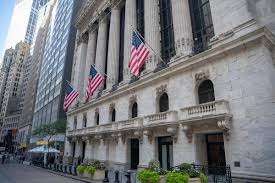On Wednesday, US stocks experienced a volatile day following the Federal Reserve's decision to cut interest rates for the second time this year. Initially, stocks surged to new all-time highs but ended up erasing gains after Fed Chair Jerome Powell hinted that a December rate cut is uncertain. The market reaction was pronounced, with the S&P 500, Nasdaq Composite, and Dow Jones Industrial Average all dipping into negative territory.
One notable mover in the market was Nvidia, whose stock soared after President Trump mentioned potential relief from restrictions affecting its sales in China. Trump's optimism ahead of a meeting with Chinese President Xi Jinping lifted Nvidia shares, pushing the AI chipmaker's market value over $5 trillion for the first time. This surge came on the heels of Nvidia closing at a record high the previous day following positive announcements from its GTC event.
Investors' focus now shifts to the upcoming earnings reports from tech behemoths dubbed the "Magnificent Seven," which include Alphabet, Meta Platforms, Microsoft, Apple, and Amazon. Analysts are keenly watching for updates on data center investments and the performance of AI-related initiatives. Any underwhelming results in this tech-heavy earnings lineup could have broader market implications.
During a post-decision press conference, Federal Reserve Chair Jerome Powell noted troubling signs in the job market, citing layoffs at companies like Amazon and UPS. Powell highlighted concerns about firms cutting back on hiring or laying off workers due to advancements in artificial intelligence. While acknowledging these challenges, he also recognized a divide in spending behaviors between lower and higher-income households, indicating a "bifurcated economy."
Powell delved into inflation dynamics, revealing a more nuanced picture beneath the surface. He attributed goods price increases to tariffs rather than broad-based inflationary pressures. Powell indicated that underlying inflation, excluding tariff impacts, is closer to the Fed's target of 2%, around 2.3% to 2.4%. Reiterating the Fed's commitment to achieving the 2% inflation target, Powell emphasized the importance of addressing tariff-driven pricing anomalies.
The Fed's decision to cut interest rates by 25 basis points was accompanied by a 10-2 vote, highlighting internal dissent among policymakers. Notably, Fed Governor Stephen Miran pushed for a larger rate cut, while Kansas City Fed President Jeff Schmid advocated for holding rates steady. Powell emphasized that no final decision has been made regarding further rate cuts, leading to increased uncertainty among traders and investors.
Corporate earnings reports also made headlines, with Caterpillar stock surging after exceeding third-quarter earnings expectations despite facing tariff-related challenges. Similarly, Amazon announced progress on a massive data center project and its collaboration with Anthropic on custom chips.
Looking ahead, major tech earnings and ongoing economic indicators will play a crucial role in shaping market sentiment. The tech sector's performance this earnings season will provide valuable insights into the industry's resilience amid economic uncertainties and geopolitical challenges, making it a pivotal period for tech investors and analysts alike.

